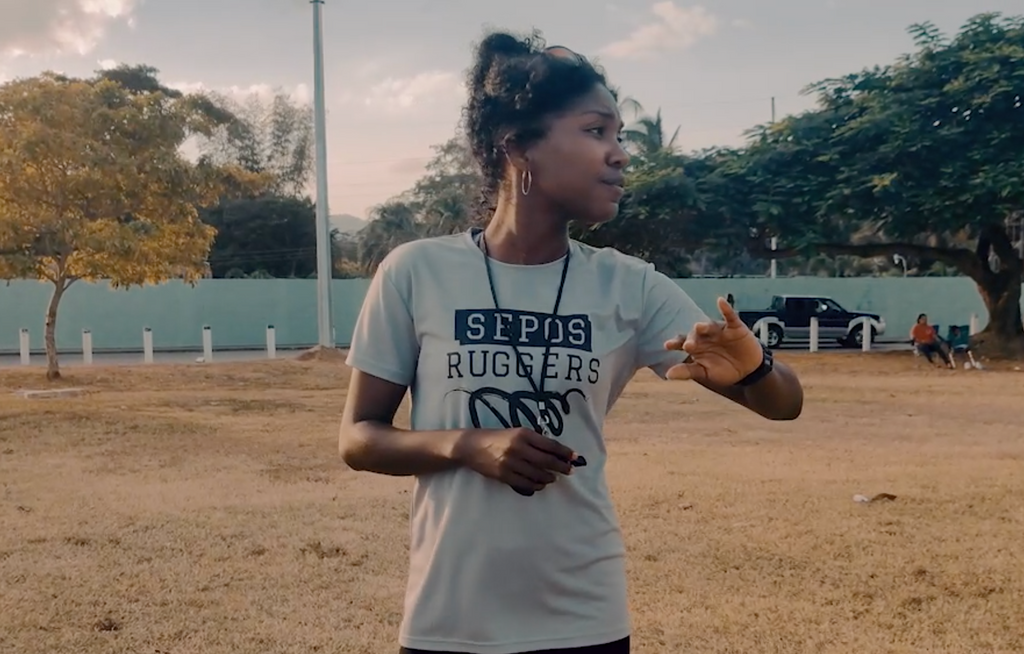In Trinidad and Tobago, coach Schezelle Fleming introduced rugby to South East Port of Spain Secondary School because she wanted students to experience the rugby family she credits for changing her life and teach them values that can help them unlock their true potential, on and off the field.
Rugby is a sport for life, no matter how you’re introduced.
For Schezelle Fleming, this philosophy has shaped her coaching method as head coach of South East Port of Spain (SEPOS) Secondary School.
“I introduced rugby into South East because rugby changed my life in a drastic way,” Fleming said.
“I feel more motivated, I want to be involved and I want to give back. I want to create families, because I became a part of my own rugby family and I feel like everybody needs to experience this.”
Trinidad and Tobago is the southernmost island in the Caribbean with a population of nearly 1.4 million people.
As a government secondary school located in the capital of Trinidad and Tobago, Fleming was met with the challenge of introducing a new and unique opportunity to young female athletes who had little experience around the sport of rugby.
UNTAPPED POTENTIAL
“Girls want to play rugby,” said Fleming. “A lot of the girls that I interact with are very shy, or extremely aggressive and sometimes it’s hard to find balance and I feel like rugby is a sport that helps you find that balance; it is something that it can teach you.”
“It’s not about being excessive, it’s about being assertive and confident.”
Founded in 1928, the Trinidad and Tobago Rugby Football Union became a member of World Rugby in 1992. The union’s men’s team have participated in every Caribbean Championship since its inception in 1966 and have been tournament champions on nine occasions.
In the women’s game, their senior women’s team have been Caribbean champions since 2008 in 15s and have been a force in sevens throughout Rugby Americas North’s (RAN) competitions dating back to 2011.
Fleming hopes that by introducing rugby to these young girls, the sport will open their eyes and hearts to untapped potential – both on and off the field.
“I got a very amazing group of girls who have exceeded my expectations in all possible ways and it’s just been amazing,” she added.
RUGBY FOR POSITIVE CHANGE
Sports can have lasting impacts on children, not only keeping them physically fit and active but also around life skills.
“The values and life skills that children learn when playing rugby can be transferred to their lives off the pitch,” said Erin Kennedy, RAN Regional Development Manager.
“The core values of rugby are respect, discipline, solidarity, integrity, and passion – all things that contribute positively to things like school, work, and at home. The children who start rugby earlier are going to carry those values and skills with them throughout their lives, making them better contributing members of society.”
As stated on their website, the Trinidad and Tobago Rugby Football Union’s critical success goals are to strengthen the development of rugby at school, age grade and community level, to establish a talent identification and an elite players programme in the form of a National Academy, to promote the game to new and wider audiences, and implement policies which will maximise the commercial value of the game.
High school can be an ideal time to introduce rugby to athletes, especially girls.
“By introducing rugby into a school environment, it allows girls to learn some of the basics and build success. These are the catalysts for girls joining a community programme outside of school. It also gives them a safe place to try something new, which are keys to increasing the number of girls playing,” added Kennedy.
EXCITING GROWTH
World Rugby and the global game has seen a monumental shift towards the growth and development of the women’s game, and many member unions around the world have seen a spike in female participants.
In Trinidad and Tobago’s case, their growth is not simply exciting because it’s happening, more because of how.
“In many unions the pathway for women in the game tends to be narrow and short – you learn to play, you play competitively, you stop playing. In Trinidad and Tobago, women have been involved in all aspects of the game for a long time, and the pathway keeps getting longer and broader,” added RAN Regional Training Manager Scott Harland.
In recent years, the results have been seen in the numbers and quality of women in all roles, including players, coaches, referees, leaders and volunteers throughout the union.
“A young girl playing rugby in Trinidad and Tobago can now see role models for the many directions her life in rugby might take, which is vital to keeping her in the game,” added Harland.
“I expect Trinidad and Tobago to keep impressing – not just in growth, but also with the heights women in rugby rise to.”
Article and photos by Rugby Americas North

